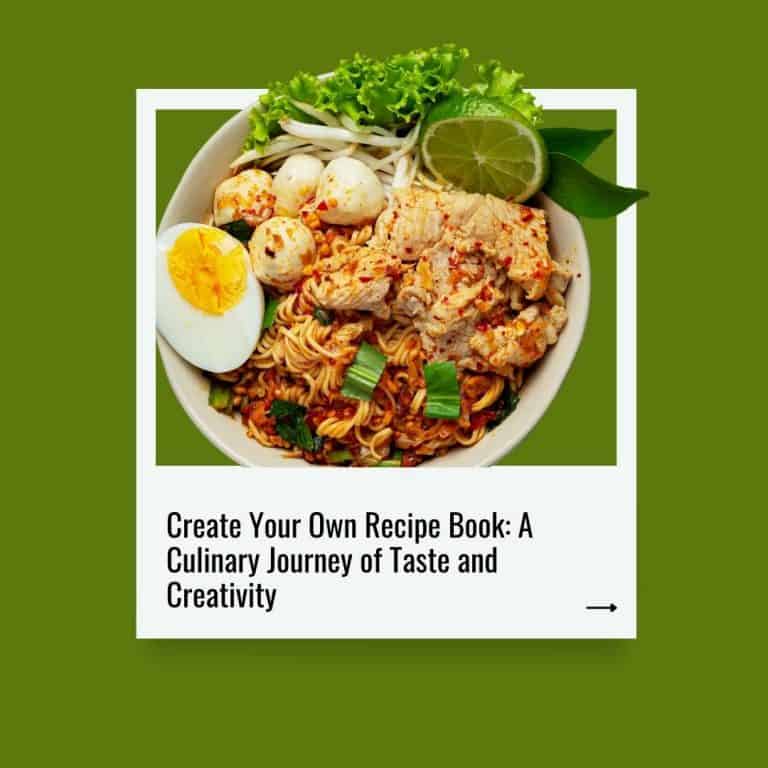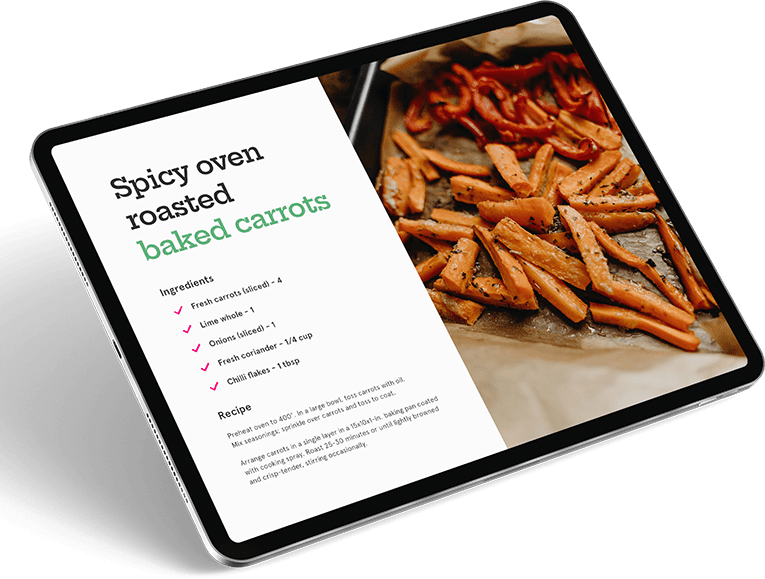Are you passionate about cooking, experimenting with flavors, and sharing your culinary creations with others?
You likely already have a blog or social media page for food and drinks. Any way to share your passions with the world is fantastic!
So, why not take it a step further and create your own recipe book?
Creating a recipe book is an exciting journey that you can fill with delicious discoveries along the way. It’s also a great way to express yourself creatively and showcase your unique cooking style.
At KitchenBloggers, we share the same joy for cooking and blogging.
Let’s take you through creating your own recipe book step-by-step!
Table of Contents
ToggleWhat Is a Recipe Book?
A recipe book, also known as a cookbook, is a compilation of recipes that provide detailed instructions for preparing various dishes. It can also include tips on cooking techniques, kitchen tools, and suggestions for meal planning.
The recipes are typically organized by category, such as appetizers, main courses, or desserts, making it easy for readers to find the dish they want to cook.
This guide helps novices in the kitchen and serves as a treasure trove of inspiration for seasoned cooks wishing to experiment with new flavors and techniques.
Why Should You Create One?
Before we dive into the nitty-gritty of creating your recipe book, let’s explore why this culinary endeavor is worth your time and effort.
Express Your Culinary Creativity
Creating a recipe book is the perfect outlet to express your culinary creativity. It’s an opportunity to showcase your unique cooking style and the innovative flavor combinations you’ve discovered. Each recipe you include is a testament to your creativity and passion in the kitchen.
Share Your Love of Cooking
You can share your love of cooking with a wider audience through your recipe book. Each page will reflect your enthusiasm for food and your joy in preparing and sharing meals. Your personal anecdotes and cooking tips can inspire your readers, encouraging them to explore their culinary passions.
Preserve Family Recipes
A recipe book can act as a wonderful keepsake, helping you to preserve and share cherished family recipes. It’s a beautiful way to honor your family’s food traditions and keep them alive for future generations.
Potential Income Source
Selling your recipe book could provide a potential source of income. As you build your reputation within the food blogging community, your book can become a trusted resource for aspiring cooks and food enthusiasts.
Personal Growth and Accomplishment
Creating a recipe book involves considerable planning, research, and effort. The result is not only a collection of your favorite recipes but also a testament to your personal growth and accomplishment in the culinary field. The sense of pride you’ll feel when you see your recipes compiled in one place is unparalleled!
Getting Started: Recipe Selection and Organization
Now that we’ve highlighted the “whys,” let’s dive into the “hows.” When you create your own recipe book, the first two steps will always be the following:
Step 1: Select Recipes
When selecting recipes, aim to create a collection that uniquely reflects your reason for creating the book in the first place. Make sure it resonates with you and the readers of your book. This step will take time, but it’ll be the foundation of your entire book.
Step 2: Organize Recipes
Once you have your recipes, the next step is to find a way to organize them that makes sense for both you and the reader. The purpose of this step is to make it easy for the reader to find what they need. To do this, think about how you would search for a recipe if you were looking for one.
Designing Your Recipe Book
Next comes the fun part: designing! You have complete control over the visuals of your book, so get your creative juices flowing.
Step 3: Layout and Formatting
The visual appeal of your recipe book is crucial. You can create a stunning layout with readily available cookbook templates and tools, even if you’re not a professional designer.
- Cover Design: Design an eye-catching cover that reflects the essence of your cookbook. Include a title, your name, and a captivating image or illustration.
- Typography: Choose fonts that are easy to read and match the overall theme of your book.
- Images: High-quality food photography is essential. If you’re not a photographer, consider investing in professional photos or collaborating with a photographer.
- Consistency: Maintain a consistent layout and format throughout the book. Use the same font, colors, and styling elements.
Step 4: Recipe Presentation
When presenting your recipes, focus on clarity and user-friendliness:
- Ingredients and Instructions: List ingredients and provide step-by-step instructions. Use bullet points or numbered lists for easy readability.
- Measurements: Include metric and imperial systems measurements to cater to a wider audience.
- Cooking Tips: Share helpful tips, variations, or substitutions to enhance the cooking experience.
- Nutritional Information: If relevant, include nutritional facts for each recipe.
Promoting Your Recipe Book
Once your recipe book is ready, it’s time to promote it to your target audience. Here are some marketing strategies:
Social Media
Leverage your social media platforms to create buzz about your recipe book. Share teaser images, behind-the-scenes glimpses, and cooking tips related to your recipes. Use relevant hashtags to reach a broader audience.
Blog Posts
Write blog posts on your website about the process of creating your cookbook. Share anecdotes, recipe highlights, and the journey behind your book. Optimize these blog posts for SEO to attract organic traffic.
Email Marketing
If you have an email list, send newsletters to your subscribers announcing the cookbook’s release. Offer exclusive discounts or bonuses to incentivize pre-orders.
Collaborations
Collaborate with food influencers or bloggers to review your cookbook and share it with their audience. Their endorsement can significantly expand your reach.
Launch Event
Host a virtual or in-person book launch event. Invite friends, family, and followers to celebrate the release of your cookbook. Consider doing live cooking demos or Q&A sessions during the event.
Challenges When You Create Your Own Recipe Book
Creating your own recipe book entails challenges. Let’s discuss a few of them:
Digital vs. Print Dilemma
One of the most challenging decisions when publishing a cookbook is whether to produce a digital or print version. On the one hand, creating a digital recipe book offers wider reach, interactive features, and cost-effectiveness. On the other hand, print recipe books can be a tangible keepsake and have gift potential and marketability. Ultimately, your choice between digital and print may depend on your goals, budget, and target audience.
Lack of Recipes
Creating a recipe book requires a significant number of unique and exciting recipes. Developing, testing, and perfecting these recipes can be time-consuming and daunting. If you’re starting with a small collection, curating enough quality recipes that cater to various dietary preferences and skill levels may be challenging.
Recipe Testing and Editing
A successful cookbook requires thoroughly tested and foolproof recipes. It means repeatedly cooking and tweaking each recipe to ensure it works perfectly every time, which can be labor-intensive and costly.
Additionally, professional editing guarantees that the instructions are clear, accurate, and easy to follow.
Professional Photography
A good recipe book isn’t just about the recipes but also the visuals. High-quality, appealing food photography can significantly enhance the attractiveness of your cookbook, enticing readers to try your recipes. However, hiring a professional photographer can be expensive, and taking the photos yourself requires skill and equipment to achieve the desired quality.
Designing
Not everyone can be a design expert, but a great cookbook requires an attractive cover and layout. A professional designer can do the job for you, which might add to your expenses. If you decide to do the task yourself, many tools and resources are available online to help you create stunning designs.
Licensing and Copyright Issues
Creating a recipe book involves more than just writing recipes. You must also consider the legal aspects of publishing a cookbook, such as licensing rights, copyright information, and trademarks. It can become complicated for inexperienced authors, so research and get all the facts before taking on this type of project.
Create Your Own Recipe Book With KitchenBloggers
As we mentioned, KitchenBloggers shares the same joy for cooking and blogging, and we understand how your own recipe book can change your life.
Our team takes great pride in the originality of our recipes and food photography. We exclusively create all the culinary content and images available for purchase. And when you buy from us, you also receive a license to use our unique recipe content and visually stunning food photography for your commercial needs!
KitchenBloggers underscores the significance of correctly licensing recipes and digital media work, as it contributes positively to business operations. With us, you can really create your own recipe book that mirrors your journey and soul in the kitchen.
Roll up your sleeves, start compiling those recipes, and embark on your culinary adventure to create your own recipe book. KitchenBloggers is here to help you along the way!
FAQs
How can I make my own recipe book?
You can make your own recipe book by using an online tool like Canva, finding a suitable template, and customizing it to add your own recipes.
How to make your own recipe book online for free?
It is possible to make your own recipe book online for free with Canva.
What is the app that makes your own recipe book?
Canva is a popular app that you can use to make your own recipe book.
Do recipe books make money?
Yes, a well-designed recipe book with amazing recipes can be sold online to make a significant amount of money.


